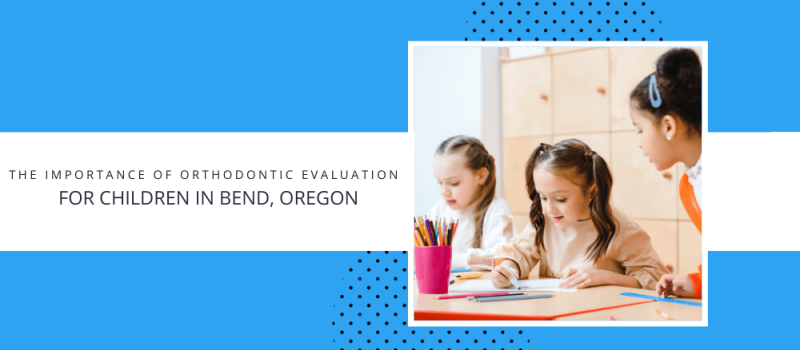
The journey towards optimal oral health often begins at a tender age. In Bend, Oregon, where the standards for healthful living are perceptibly high, the significance of early orthodontic evaluation for children is receiving increasing attention.
An orthodontic assessment, as simple as it might appear, can be pivotal in averting future dental complications, fostering better oral hygiene, and promoting overall wellness. This is especially crucial for children, whose oral structures are still in the developmental stages.
A child’s first orthodontic evaluation can serve as an early warning system for potential oral health issues. It allows for the timely detection of dental issues and the development of a personalized care plan that can guide a child towards achieving and maintaining a healthy smile.
The American Association of Orthodontics recommends that a child’s first orthodontic visit should occur no later than age seven. At this age, the presence of a mix of primary (baby) and permanent (adult) teeth enables orthodontists to diagnose and correct tooth and jaw problems sooner, saving your child time, discomfort, and potentially significant expense in the future.
So, let’s delve deeper into the significance of this seemingly modest dental procedure and its long-term implications for your child’s oral health.
1. Early Identification of Dental Issues
Early orthodontic evaluations can help identify potential dental issues before they become more serious. During the evaluation, the orthodontist will assess your child’s dental development and look for any potential concerns, such as overcrowding, misaligned teeth, and bite problems. Detecting these issues early offers the opportunity for interventions that can simplify future treatments and reduce the need for more invasive procedures later on.
2. Best Age for an Initial Orthodontic Assessment
The American Association of Orthodontists (AAO) recommends children receive their first orthodontic evaluation by age 7. At this age, children typically have a mix of permanent and primary teeth, making it easier for orthodontists to identify potential developmental issues. While not all children will require immediate treatment, early evaluations can help pinpoint the best time to begin treatment, if necessary.
3. Benefits of Early Intervention
When orthodontic issues are detected early, interventions can be customized to address concerns during the child’s growth stages. This proactive approach is often referred to as Phase I or interceptive orthodontics and can include treatments such as palate expanders, braces, or space maintainers. Early intervention can yield multiple benefits, including:
- Improved dental health: Addressing dental issues early can prevent tooth decay and gum disease, as well-aligned teeth are easier to clean and maintain.
- Decreased need for tooth extractions: Creating space for permanent teeth to emerge correctly may minimize the need for extractions later on.
- Simplified future treatments: Many orthodontic issues are easier to correct when addressed early, potentially reducing the complexity and duration of future treatments.
- Reduced risk of dental injuries: Correcting protruding front teeth decreases the risk of dental trauma during sports or falls.
4. Monitoring Your Child’s Dental Development
Following the initial orthodontic evaluation, the orthodontist may recommend regular check-ups to monitor your child’s dental development and determine the optimal time to initiate treatment if required. These appointments are particularly essential for children with a family history of dental issues, as they may have an increased risk of developing orthodontic concerns.
5. Early Treatment Doesn’t Guarantee Future Orthodontic Success
It’s important to note that early intervention may not fully address some orthodontic issues, and additional treatments, such as full braces or Invisalign, may still be necessary as the child enters their teenage years. However, early treatment can significantly simplify these future treatments and often result in improved outcomes.
6. Parental Involvement in Orthodontic Care
As a parent, your involvement is essential in your child’s orthodontic journey. You play a critical role in ensuring your child attends regularly scheduled appointments, maintains good oral hygiene practices, and follows the orthodontist’s recommendations. Educating yourself on the benefits of early orthodontic evaluations and maintaining open communication with your orthodontic care provider can positively impact your child’s dental health.
By understanding the value of early orthodontic evaluations and scheduling your child’s first appointment with an orthodontist in Bend, Oregon, you can establish the foundation for a lifetime of healthy and beautiful smiles. Trust the expertise and guidance of the dedicated team at Sullivan Orthodontics to support your child throughout their orthodontic journey and help them achieve optimal oral health.
Take the First Steps Towards a Healthy, Beautiful Smile for Your Child in Bend
Early orthodontic evaluations play a significant role in promoting healthy dental development for your child. By identifying potential issues at an early stage, orthodontists can provide timely interventions to simplify future treatments and optimize results.
As parents, it’s crucial to stay informed about the orthodontic care options and take proactive measures to ensure your child receives the most effective treatment tailored to their dental needs.
At Sullivan Orthodontics, our experienced team of orthodontists in Oregon is committed to guiding your child through their orthodontic journey and delivering the highest quality treatment and care. Our personalized approach ensures that your child receives the most effective interventions to address their unique dental issues, while also making them feel comfortable and welcome within our practice.
Don’t let the window of opportunity for early evaluations pass by—schedule an appointment for your child today and take the first steps towards a healthy and dazzling smile that will last a lifetime.
